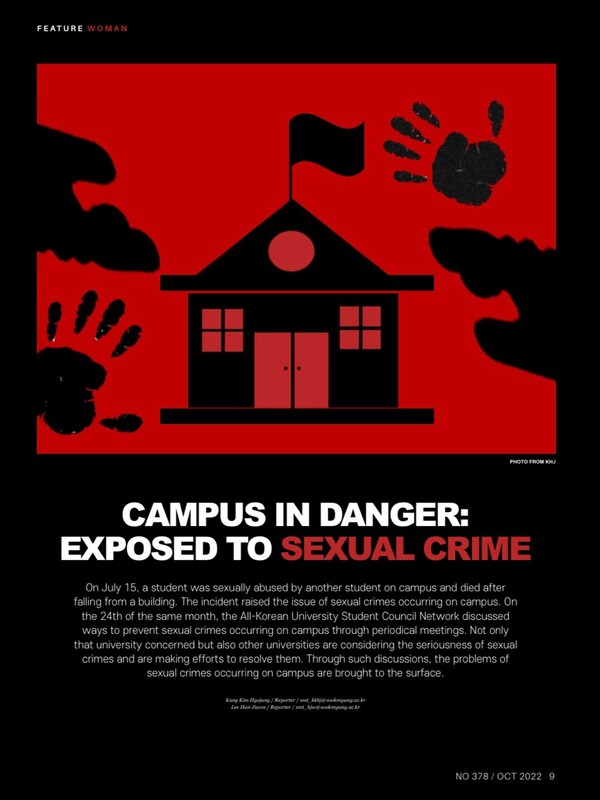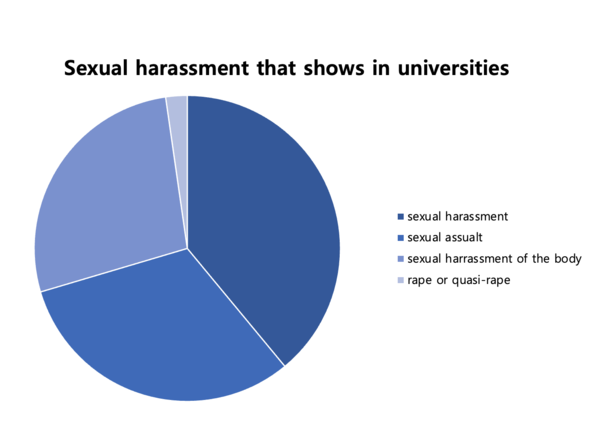
On July 15, a student was sexually abused by another student on campus and died after falling from a building. The incident raised the issue of sexual crime occuring on campus. On the 24th of the same month, the All-Korean University Student Council Network discussed ways to prevent sexual crimes occurring on campus through periodical meetings. Not only that university concerned but also other universities are considering the seriousness of sexual crimes and are making efforts to resolve them. Through such discussions, the problems of sexual crimes occurring on campus are brought to the surface.

A sexual assault perpetrator, Kim Jinsong
Many types of harassment
Sex crimes refer to all crimes related to sex, such as sexual assault and sexual harassment, as well as verbal expressions that cause sexual offense. According to the report by Jung Chanmin, who is a Member of the National Assembly, 'Sexual Harassment and Sexual Assault in Universities Nationwide,' the number of sexual harassment and sexual assault cases on campus stood at 346 in 2019, an increase from 182 in 2016.1) As this figure has doubled in three years, it shows that the rate of sexual crimes has increased. Also, the 2020 National Human Rights Commission of Korea's report on sexual harassment and sexual assault at universities shows that sexual harassment was the most common (34.4%). It was followed by forced sexual assault (27.7%), sexual harassment of the body (24.1%), and rape or quasi-rape (2%). By distinguishing sexual harassment from sexual harassment of the body, sexual harassment is not only related to making sexual comments about the body or appearance, but also the act of asking about personal sexual experiences and disseminating that information. This report points out that physical contact and verbal expressions that induce such sexual offense are both types of sexual crime that occur frequently on campus. This is sexual harassment not only when such contact occurs but also when it is without consent.
Recently, in addition to sexual harassment and sexual assault, other types of sex crimes have occurred in universities. One of these is illegal filming. These days, the news shows illegal filming taking place in public restrooms and shower rooms at universities, and illegal filming cameras are able to be secretly disguised. Also, because of the evolving technology of cameras, victims of illegal filming are increasing. With the use of micro cameras or modified cameras being used for this purpose, people cannot easily find them. A graduate student who was a victim of illegal filming said, "I was still reluctant to use a changing room or public toilet due to the trauma of illegal filming damage, so I chose a women's university for my graduate school."2) Illegal filming can permeate victims' daily lives and cause them to continue to be vigilant about invisible cameras, reducing the scope of their choices in the future. In August this year, a man was caught illegally filming his classmates in the restroom at Yonsei University in Seoul. Also, in June, another was caught for the same thing at a festival held at Korea University in Seoul. This series of sex crimes on campus raises doubts about the existence of a 'safe campus.'

Difficulties in solving the unremarkable problem
The number of sex crimes committed on campus is increasing, and digital sex crimes such as illegal filming are a big problem. Even though sexual crimes on campuses are a serious problem, it is difficult to eradicate them. According to the 2020 National Human Rights Commission's report on sexual harassment and sexual assault, sexual language and sexual objectification expressions used to be considered humorous and just a joke by students. Furthermore, the idea that raising questions about sexual assault is unnecessary and deserves condemnation makes it even more difficult to solve sex crimes. This atmosphere in which verbal expressions that cause sexual offense are regarded as jokes is prevalent throughout universities. It gives the wrong idea about sex and makes it hard to recognize that such behavior is a sex 'crime.' Moreover, criticism against individuals who express displeasure with sexual harassment creates a closed system that conceals sexual crimes and causes repeated victimization by holding the victims accountable. After the incident of sexual assault and death on campus, most reports used the word "drunken state victim."3) The word implies that this crime is due to the victim's carelessness. Also, it can be difficult for people to focus on the criminal act and believe it is a crime. Such secondary victimization could cause a victim to experience difficulties in daily life in a society where people doubt a victim's degree of harm.
Education to prevent sex crimes has been steadily promoted even while there is a lack of sexual awareness in universities. From the current law on the prevention of sexual assault and the protection of victims, the heads of higher education institutions are required to provide sexual crime prevention education for at least an hour once a year for employees and students. It means that the law holds the heads of institutions responsible for education. In other words, all students are not forced to participate in this education. According to the report on "2021 Sexual Assault Prevention Education Status" released by the Ministry of Education, the average sexual assault prevention education pass rate was 46.1% among 236 university students whose information was disclosed. It means that more than half of all students have not completed it. Sexual assault prevention education is also being pointed out in terms of its effectiveness. Lee Mijung, a senior researcher at the Korea Women's Development Institute, said, "We should consider various ways to increase the effectiveness of education such as gender separation education and peer-reviewed education, not large-scale online education."4) It shows that the current education provides only universal and essential information in an online format rather than customized education. Choi Sookjung, a student at Busan National University, said, "By considering the current situation that the frequency of contact between students through face-to-face classes, club activities, and so on is increasing, prevention sex crime education should be conducted effectively."5) This statement emphasizes the need for proper education reflecting the current situation at university where face-to-face contact through various activities on the up. It can be seen that education that reflects the evolution of society and focuses on each student will be needed to solve this problem.

Students Demonstrating To Prevent Secondary Victimization
Solutions, but not perfect
Each university has a counseling center for victims of sexual crimes. The government also announced a policy requiring all universities to set up counseling organizations for sexual crimes by March 2022. However, according to a report released by the Ministry of Education in July 2022, 56 out of 411 universities (13.6%) operate a counseling center for sex crimes as a separate organization as of 2021. More than half have counseling organizations attached to general counseling centers or operated by administrative agencies within the university. In this way, if the gender counseling center does not have an independent status within the university, it may be subject to pressure. To supplement these limitations, the government made it mandatory to establish and operate a new independent center. In addition, it was specified that the qualifications of the head of the center should be above that of associate professors or external experts with abundant knowledge and experience in human rights protection. The role of a center's personnel is also divided into preventing and responding to sexual crimes and counseling and investigating human rights violations. Meanwhile, counselors point out that there can be problems with work overload. Hwang Mihyang, a permanent director of the Gender Research Institute, said, "There is a very small number of counseling organizations, and even they have mostly part-time employees."6) Simply installing a counseling organization and increasing their number is not the only way to improve the quality of post-sex crime response. Thus, there is a need for the government and universities to allocate enough workers to meet the number of counseling organizations in the school so that counseling can be carried out smoothly.
Although universities are trying to deal with sex crimes that have occurred on campus, to prevent them in advance, the need to improve gender sensitivity should be considered. Gender sensitivity refers to the detection of sexist elements in daily life with an understanding and knowledge of gender imbalance. According to the 2021 Korea Sexual Violence Relief Center's statistics and trend analysis released by the Korea Sexual Violence Counseling Center on April 2, sexual violence counseling cases where women are victims reached 1,323 out of 1,415 (93.5%). Some argue that the government needs to come up with victim-centered measures by cultivating gender sensitivity. Korea Women's Hot Line says, "People miss the majority of cases of violence against women due to unequal gender relations. Schools and other communities should ensure the rapid handling of cases according to correct procedures and internal regulations from a gender equality perspective."7) The institution argues that the government should recognize and deal with the fact that sexual violence cases in which women are the victims take place amid inequality in our society. It seems that recognizing that the majority of the victims of such crimes are women could help to decrease sex crimes. Further, individuals may need to improve their gender sensitivity to prevent fundamental sex crimes. One college student said, "We need to point out that there was no opportunity to evoke gender sensitivity on campus due to sex crimes in the university."8) Through this, it is possible to feel the need to provide students with opportunities to recognize and improve gender sensitivity at the school level through the program. Before coming up with such a physical solution, it is also necessary for people to have a mindset that can help prevent sexual crimes mentally.

A representative of Korea Women's Hot Line, Go Migyeong
How to make a safe campus
Due to the recent sexual assault and death incident at a university, there has been controversy over the problems of sexual crimes on campuses. In addition to sexual harassment and sexual assault, digital sex crime is also taking place at universities. However, considering sexual harassment as a joke between students and the low effectiveness of sex crime prevention education at university can make it difficult to recognize sex crimes. Universities and the government are trying to operate and supplement sex counseling centers to solve these problems. Nevertheless, there are also doubts about the effect of education on the prevention of sex crime. Therefore, both individuals and society need to make efforts to prevent sex crimes from the perspective of gender sensitivity.
1) Choi Yuna, "Inha University's "Under-Average" Sexual Violence Prevention Education Completion Rate… Campus Is in Danger", The Hankyoreh, August 23, 2022
2) Yoon Hyein, Oh Yujin, "53% Of Men in Their 20S, "Kiss and Caress Agreed to Sex"...University Sexual Violence Risk Level", JoongAng Ilbo, July 23, 2022
3) Kim Yujin, "Drunk Victim of "Death From a Fall in Inha University" Was Dragged to the Crash Site After Got on the Elevator", Herald Corporation, July 22, 2022
4) See Footnote 1
5) Kim Dongwoo, ""Let's Get Rid of Blind Spots for Sex Crimes" Special Mission to Strengthen Education and Crime Prevention in Campus", The Busan Ilbo, July 26, 2022
6) Kim Bitna, "Self-Resolving Sexual Violence in University", Herald Corporation, August 4, 2022
7) Kim Jungwan, "Worry About the Social Safety Net "A Red Light for Sex Crimes in College..." the Solution Is", The Asia Business Daily, July 29, 2022
8) Jang Narae, "[Interview] Inha University's 'Ripped Off Wall Poster'…"the Reason Why They Put It on the Square, Not Online"", The Hankyoreh, August 3, 2022
Kang Kim Hyojung / Reporter
smt_kkhj@sookmyung.ac.kr
Lee Han Jiwon / Reporter
smt_hjw@sookmyung.ac.kr


